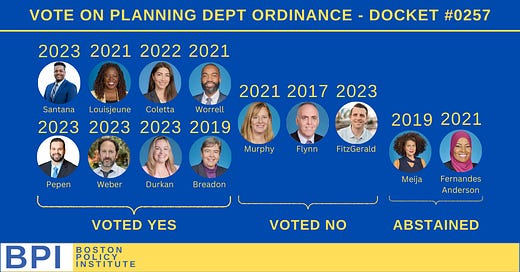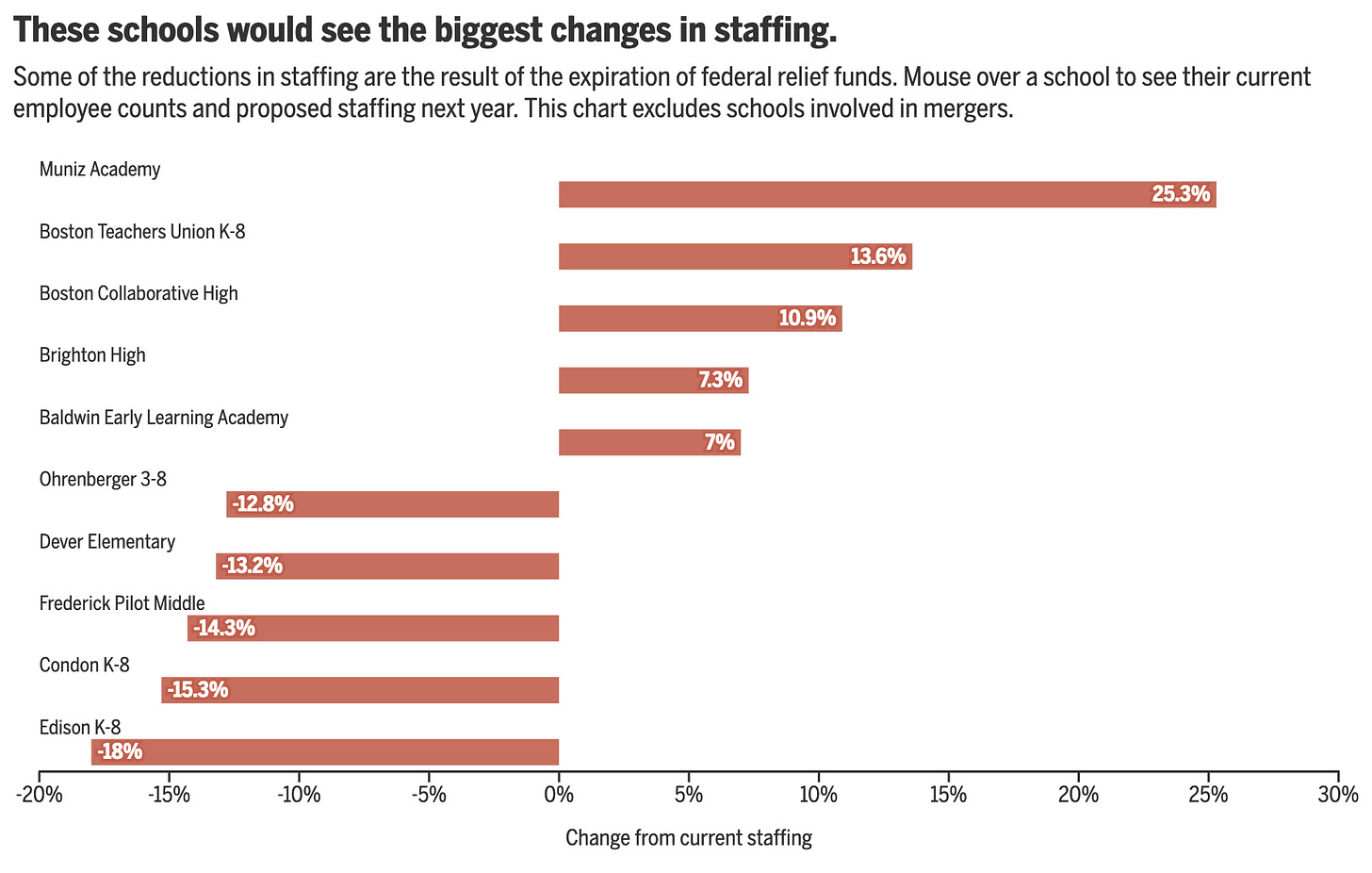Weekly Transcript Round-Up: March 29, 2024
BPI on NBC10's 'At Issue' this Sunday; Globe Ed Board cites BPI report in response to Mayor Wu's tax increase; Council passes planning dept ordinance after fierce debate; School Cmte passes BPS budget
This week Boston saw a lot of policy action and this weekend make sure to tune into NBC 10 at 11:30 AM to ‘At Issue’ - BPI Executive Director Gregory Maynard is the guest this week. Here is what is in today’s weekly round-up:
Boston Mayor Michelle Wu proposes home rule petition to increase commercial taxes over state-mandated limit and the Boston Globe Ed Board responded
Boston City Council passes the Wu administration’s planning department ordinance after a fierce, grueling debate and parliamentary maneuvering
The Boston School Committee passed a Boston Public Schools budget that includes cuts
MAYOR WU ASKS FOR TAX INCREASE, GLOBE ED BOARD RESPONDS
There is not a transcript for the top item on this week’s transcript round-up, but there are a lot of articles: in a press briefing on Thursday Mayor Michelle Wu and Boston’s Treasurer-Collector & CFO Ashley Groffenberger announced an “emergency tax” that would exceed state mandated limits on taxing commercial property in order to avoid hundreds of million of dollars in budget cuts. Read more about the briefing and proposed tax increase in the Boston Globe, the Boston Herald, and the Boston Business Journal.
The Boston Globe’s Editorial Board responded to Mayor Wu’s proposal this morning with an editorial on titled: ‘Stopping Boston’s ‘doom loop’ means it must face its tax woes’ - read it here. The Globe’s editorial board credited BPI’s ‘The Fiscal Fallout of Boston’s Empty Offices’ report with launching the current conversation, name-dropping the organization and writing:
When a report detailed the pandemic’s gloomy — and lingering — consequences for Boston’s tax picture just last month, city officials remained firmly in denial. Today those problems are bubbling to the surface, in a way that Mayor Michelle Wu has finally acknowledged can no longer be ignored.
The editorial highlighted a call by business leaders to “closely examine recent anti-growth policies that hinder new development, while also finding ways to diversify its revenue streams to ensure Boston does not rely on any one sector to meet its residents’ needs.” Two of those policies that business leaders are likely pointing to were passed by the Wu administration in just the last year:
Increased the amount of income-controlled units required in new residential construction and expanded the number of projects the policy applies to - this increases costs for builders that is passed on to market-rate tenants & buyers through higher rents and home prices; and
Doubled linkage fees on new lab space - the Boston Globe recently reported on how “an overbuilt market” for lab space was resulting in lower rent.
Mayor Wu said she would submit a home rule petition to allow the tax increase to the City Council next week.
BOSTON CITY COUNCIL HAS FIERCE DEBATE, PARLIAMENTARY MANEUVERING, BEFORE PASSING WU ADMIN’S PLANNING DEPT ORDINANCE
After a grueling debate that lasted more than two hours at the City Council’s regular meeting on Wednesday, the body voted 8 to 3, with 2 Councilors abstaining, to pass the ordinance - read the amended ordinance starting on page 44 of this week’s agenda packet. Here is how the Council voted on the ordinance:
Here are the highlights:
District 1 Councilor Gabriela Coletta turned her chair’s report recommending voting in favor of the ordinance spoke into an almost 15 minutes speech. Her speech included an in-depth defense of the process that she ran and the amended ordinance her committee produced - Councilor Coletta is Speaker 20 and starts at the 1:20:24 mark in the transcript.
Councilor at Large Julia Meija - Speaker 2 in the transcript - spoke a lot during the debate. She offered an amendment to the ordinance that would have created an independent community commission to monitor the new planning department at the 1:34:24 mark and demanded a larger role for the community throughout the Council debate. Councilor Meija followed that by pointing out two of Mayor Wu’s inter-governmental relations staffers in the Council chamber and defending the 2022-23 City Council in a statement that starts at the 2:10:01 mark, saying:
I am so proud of everyone here. Clare, [Director of Intergovernmental Relations Clare Kelly] shout out to you. And Neil, [Intergovernmental Relation Chief of Staff Neil Doherty] I see y'all out here hustling all your votes . . . And I would have to say that contrary to popular belief, the Council that was in place previously actually managed to get a lot of things done. We fought for participatory budget. We passed an elected school committee. We did a lot of disruptive things, which is why so many of us were targets. And so I reject any notion that we were a dysfunctional council because, in fact, we passed reparations. We passed things that made a lot of people feel uncomfortable, and we did that going against the machine.
Check out BPI’s Instagram and TikTok pages for video of that statement from Councilor Meija.
Councilor Meija also tried to throw parliamentary sand in the City Council’s gears, at one point asking “Can we recess? I need the clerk, and I need my legal lawyer here too,” at the 3:12:18 mark, and getting a brief recess and a rules debate. After all of that, she voted present on the ordinance.
District 3 City Councilor John FitzGerald, who has consistently said he thinks the ordinance is the wrong way to reform Boston’s planning and development process defended the BPDA in a 6 minute speech. The speech went into his time at the agency and views on community trust and the recent results achieved by the Agency, and also included this memorable line:
“This is the largest transfer of land, money, power, and authority in the history of Boston, and I have constituents that have gone through a longer process trying to put a back deck on their house.”
Councilor FitzGerald is Speaker 6 in the transcript and his speech starts at the 1:44:27 mark.
After starting at 1:19:56 mark by reading out the docket, the final vote was announced by City Clerk Alex Geourntas at the 3:33:59 mark - Clerk Geourntas is Speaker 1 in the transcript.
SCHOOL COMMITTEE PASSES BUDGET THAT LAYS OFF STAFF
A note on the transcript for the March 27 School Committee meeting: as of the time this newsletter is being written Boston City TV has not posted the video of Wednesday’s school committee meeting, so we do not have an AI-generated transcript available. You can read the transcript of last week’s meeting here.
The Boston School Committee passed Boston Public Schools FY25 budget on Wednesday, in a 5 to 2 vote. Here is how the School Committee voted on the budget:

The budget passed despite “multiple members expressed concerns about the budget and frustration that their questions about the budget remain unanswered,” as the Shah Family Foundation wrote in their summary of the latest episode of ‘Last Night at School Committee.’ The Boston Globe’s article about Wednesday night’s vote included this line:
“If I do not vote in favor I would be delaying the process,” said member Rafaela Polanco Garcia.
Cuts in the FY25 budget are being driven by the end of federal aid, which BPS used to hire hundreds of new employees over the last several years. Now many of those people are being laid off - the Boston Globe has an excellent analysis of the impact of those cuts, which included this chart:
Now the BPS budget will go to the City Council as part of Mayor Wu’s FY25 City budget. The City Council got involved in this school budget process before the School Committee passed it in what Ways & Means Chair Brian Worrell has described as a change from past practice. Councilor Worrell’s committee held a working session where BPS executives including Superintendent Mary Skipper and Interim CFO David Bloom presented the budget and answered questions from Councilors. At a School Committee’s meeting earlier this year Councilor Worrell laid out a vision for significantly more Council involvement in the BPS budget process in the future, saying:
On the budgetary process side of things, we're definitely interested in a multiyear capital budget going forward. Similar to the rest of the city departments and in the perfect world, we will be talking about multiyear operating budgets.
Watch the video of Councilor Worrell’s testimony in front of the School Committee here and read the transcript where he is Speaker 20 and begins speaking at the 2:10:06 here.
ANOTHER IMPORTANT STORY IN BOSTON FOR THE REGION TO FOLLOW
Last Friday, March 22, a judge said the renovation of White Stadium could proceed, rejecting arguments made by the Emerald Necklace Conservancy in their lawsuit against the City of Boston that asked for a pause on the planned work in Franklin Park - the Dorchester Reporter has more.
On Monday, March 25, a number of elected officials who represent the area around White Stadium hosted a community meeting where Wu administration officials, BPS executives, and representatives from the Boston NWSL expansion team’s ownership group gave a presentation about the current stadium proposal and answered questions in what the Dorchester Reporter called a “chaotic” meeting - read the article.
Boston Policy Institute, Inc is working to improve the public conversation - help us by following BPI on Facebook, Instagram, Threads, Twitter, and LinkedIn.






